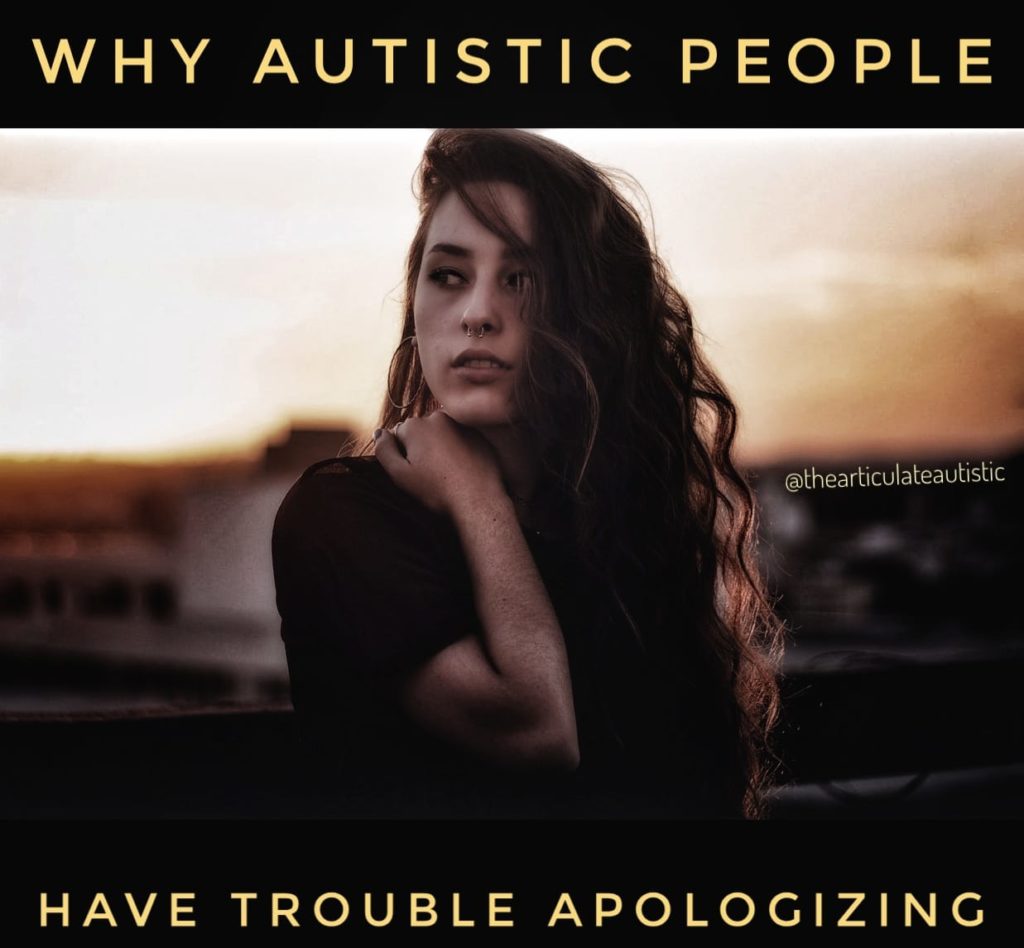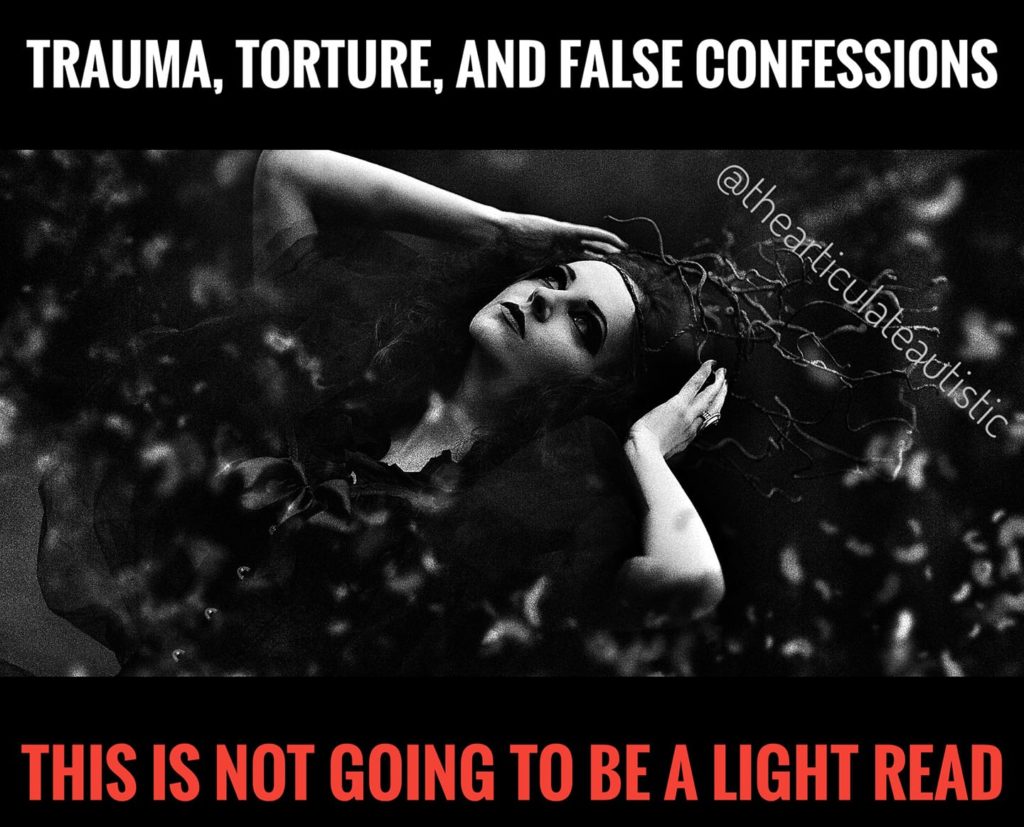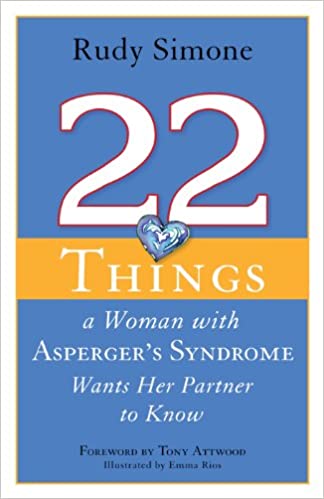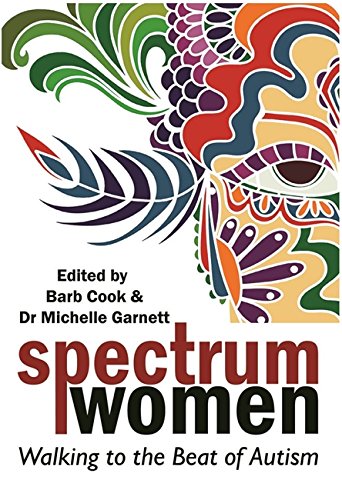Why Many Autistic People Have Trouble Apologizing

“I’m sorry.”
Those are two words that are NOT easy for some autistic people to say, but it’s not for the reasons you may believe.
Let me use myself as an example:
When I was a child, I was “in trouble” so many times for doing something, saying something, not saying something, having a certain look on my face, etc. that I became cynical and distrustful at a very early age.
– Jaime A. Heidel
I thought the neurotypical people around me were just inventing things to upset me, gaslight me, and control me. I also thought they were completely off their rocker. I mean, bonkers!
I honestly and truly believed that the entire world was unhinged and I was the only sane one around.
It took me until my early-to-mid twenties to even have a concept that I was actually causing (albeit, unintentionally) people to react to me the way they did.
This is where the words, “I’m sorry” come in. I was told to apologize for my behavior constantly as a child, teen, and young adult, and I flatly and vehemently refused to do so until I understood exactly WHY I was apologizing.
(Article continues below.)
The best way to improve communication with your autistic loved one is to understand how your autistic loved one’s mind works! Intentions, motivations, and personal expressions (facial expressions or lack thereof, body language, etc.), are often quite different in autistic people than they are in neurotypical people.
Experience a better understanding of your autistic loved one by reading books about life from an autistic perspective as well as stories that feature autistic characters. You’ll have so many “Ah ha!” moments and start seeing your autistic loved one in a different light (and you’ll have a better understanding of their behaviors, which you may have been misinterpreting up until now).
Books I recommend for a better understanding of your autistic loved one:
I would defend my view of things for HOURS at a clip, refusing to do anything else until I had:
1) Absolutely proven beyond a shadow of a doubt that I had not intended to cause any offense and had NO idea what they were talking about.
2) Learned why something I said or did was wrong.
To me, apologizing was an admission of guilt; purposeful and willful and even gleeful wrongdoing, in fact. It was me telling them, “You caught me. I’m a horrible person.”
That’s why I rarely apologized. Also, I didn’t understand what I did wrong, so, in my mind, if I apologized, it would just be empty words because I didn’t know what I was apologizing for to begin with!
How could I tell someone I was sorry if I was most likely going to turn around and do the exact same thing again 2 minutes later? Then, I would only be in MORE trouble, and people would think I was a hypocrite, too!
That would just make me look evil, as though I slapped someone, apologized, and slapped them again with a maniacal grin on my face.

I also couldn’t apologize because it was a falsehood, like saying words in a language I didn’t understand and just pretending that I did.
I mean, the words made sense, but WHY was I saying it? I didn’t (in my mind) do anything wrong!
I learned only about 4 or 5 years ago that one can apologize for causing offense even it wasn’t intended because apologizing isn’t an admission of guilt, it’s a way to acknowledge someone’s feelings.
After all, if I bumped into someone and knocked them down, I would have never, at any age, even HESITATED to apologize to them!
That was an easy cause-and-effect concept to put together in my mind, but when it came to me not understanding what offense I caused or even believing it was real (remember, I thought people were just making this stuff up because I couldn’t connect my behavior to their reactions), I could not apologize.
People accused me of being “afraid to be wrong” or, when I tried to understand why I was supposed to apologize by asking questions, they told me I was “making it all about me” and they shouldn’t have to console ME for upsetting THEM (because I would be in tears at this point).
I am not in any way a malicious person. I don’t even think to hurt people on purpose. It doesn’t enter my mind. In self-defense, yes? Just for the heck of it? No, and I can’t imagine it.
So, to be accused of being a horrible person and having wicked motivations my entire life when I’m the exact opposite and always have been was more confusing and painful than I could ever put into words.
I didn’t apologize not because I didn’t care or I thought I was right or that other people didn’t matter, I didn’t understand why I was supposed to apologize. I didn’t even know anything had happened!
I do understand now, but it’s still not easy to say, “I’m sorry” if I don’t know why, but since I know the feeling of remorse for hurting someone’s feelings is real, I can say those words and not feel like I’m lying anymore, which helps.
I will still ask for explanations, but I at least know enough to let the person calm down first.
Follow me on Instagram.
Want downloadable, PDF-format copies of these blog posts to print and use with your loved ones or small class? Click here to become a Patreon supporter!Image











In fact, it’s not necessarily because they don’t know the importance of apologizing. To autistic people, if they don’t start to say sorry from childhood, it will be stressful to start in adulthood.
Thank you SO much for writing this. I recognise some of my loved one’s experiences and some of the things she’s tried to express, but you explain it all very well. It’s been hard for me to deal with. It’s an issue we really want our other family members to understand.
Thank you so much for your comment. I’m so glad this helped you to better understand. 🙂
Appreciate this a lot came here about my 14 year old who also argues n swears blind he has done nothing wrong n never understands his wrong doings no matter how I explain. Thank you
You’re welcome. I’m glad this helped. 🙂
My dad is autistic. He never apologizes, but then claims to others that he did. It’s better to have limited to no contact. He’s always right. I’m always wrong. He can insult me as much as he wants, because in his mind “it’s true.”
That doesn’t sound entirely like an autistic trait to me. Hmmm… Not apologizing due to not understanding why something is considered wrong is on point, but telling others he did? Insulting you? That sounds like something else is going on. He may have an underlying mental health condition.
Hi Giselle, it is definitely not easy relating with anyone who behaves this way, regardless of how his brain is wired or ironclad certainty about noble intentions. And yet he lacks this ability, because he lives with a disability that you have had enough of. Don’t waste your time trying to change his mind only to reproduce the same conflict.
This sounds a lot more like narcissism.
There are a lot of overlaps in the emotional damage caused to the neurotypical because the majority of the damage is caused by the impact of the behavior. So, whether you told me I’m ugly because it’s true and you were just trying to help me, with no ill intent, or you gleefully were trying to hurt me, the impact of the message is pretty much the same.
You are absolutely correct!
I would start being sarcastic, “Ya dad, you’re always right and I’m always wrong.haha! “ Make a joke out of everything that’s negatively stated. If this method fails, then walk away. I should’ve done this in the past, or at least tried this method, though they don’t always recognize sarcasm. Instead my last words were “Go away!” and I deeply regret it.
Thank you for your insight. I have an autistic 5 year old. She refuse to apologize for a lot of behaviors that are inappropriate. If I tell her to. She gets upset say I hurt her feelings and need to say sorry for getting her upset. It is very hard to explain things. But your prospective was good to readm
When you do explain things she’s having trouble with, be sure to include as much detail as possible. Explain everything. Her brain doesn’t function and process information like a neurotypical person, so you may think you’re giving her all the information she needs, but she still needs more to understand. I offer private consultations for parents if you need extra help or tips. Here’s the link to my booking page, if you’re interested: https://www.thearticulateautistic.com/private-consultation-translation-autistic-adult/
It does sound autistic. In my experience, this is exactly what happens. People with autism are often cruel.
The thing is, and maybe this confirms that I’m autistic, but these are two different things to me.
Validating and holding space for another’s feelings isn’t hard for me. Apologizing unless I did something “wrong” is. Most people who want an apology ARE actually blaming you for doing something they think you shouldn’t have. Most people aren’t just wanting you to know how they feel, and are not usually telling you how they feel BUT blaming you for how they feel and demanding that you DO something to make it right.
This makes perfect sense of what I did was trip and knocked over a glass of milk that dumped into your dinner plate, BEFORE you were able to enjoy it. An apology, cleaning up the mess, and helping to get you a fresh plate and glass of milk is only right.
You feeling hurt because I didn’t invite you to my birthday party because you interpreted that to mean that I don’t value you and our friendship, when I didn’t invite anyone but simply went out with my boyfriend…. and I didn’t want to spend time with anyone else that day, anyways… What is there for me to “fix”? I can understand how not sharing my birthday with me could make you feel left out, if that is an expectation of yours to do with your friends, I can hold space for that…. but I’m not going to change anything. I didn’t actually DO anything that I would want to change…. so why would I apologize.
Now, IF you were super important to me I might see how important spending time on birthdays together is, and choose to consider making birthday plans with you on the future…. but if this isn’t true…. now I feel pressure to want something because you do…. when I don’t…. and that because your “feelings” are hurt, I’m responsible for meeting your expectations to prevent it from happening again.
Validating and honoring another’s experience and emotions is NOT the same as apologizing… not to me, not to a lot of people. If this were true there would be no need to repair. There would be no phrase “The best apology is changed behavoir.”
I agree with you on everything you’ve said here, actually.
Trying to in short figure this out as well. I have a student whom i am a 1:1 with, I have been around autistic and behavioral children for a long time. He blatantly got in my face yesterday saying “you dont know how much I want to punch you in the face rn”. When no demands etc being placed. Just following to make sure he was safe while trying to elope from me. He didnt want to apologize because “he didn’t know”. When in tough situations his answer us “i dont know”. He is very bright and understands right from wrong, will apologize if he steps on my toes. He hasnt person Apologized to me, my co teacher did it for him because he still was in an I dont know phase. Im just trying to understand why. It isnt the first time, but I’m used to students in this way, maybe Im too conditioned to not respond immediately or im just to easy to let it go and not teach him without warranting more threats.
Thank you so much for sharing this. I have a friend who is on the spectrum, and I don’t understand why she doesn’t apologize, even when I tell her that I was hurt by something she said. Also, when I apologize for something, she tells me, “You don’t need to apologize,” which leaves me feeling empty. I feel like I need to apologize, and when she deprives me of that, I don’t know what else to do to solve the problem.
I don’t think she sees this as depriving you, but if you feel this way, you should tell her directly and explain why, so she’ll understand. I think what she means is, “You’re completely fine by me. I don’t know what you’re apologizing for because you’ve done nothing wrong.” I’m not sure if that helps, though. Be direct with her about it if you feel you aren’t getting what you need, though. That’s the best approach for someone who needs direct and literal communication.
Imagine you’re playing a board game, and one of the people you’re playing with keeps breaking the rules. They are called out on this, because it’s not fair to the other players. Instead of apologizing and following the rules from that point on, they respond with a waterfall of crappy excuses and try to argue everyone down, as if them cheating the rules was somehow ok.
Would you continue to want to play board games with that person? NO. Then don’t be surprised when people no longer wish to interact with you, when you flout rules and then try to weasel out of accountability for having done so.
FOLLOW THE RULES.
APOLOGIZE if you have been (however inadvertently) breaking the rules.
TRY YOUR BEST TO NOT BREAK THE RULE AGAIN.
Stop trying to make simple things complicated.
For example, suppose Lisa is a very large woman, we’re talking at least 300+ pounds. There’s a rule that you’re not supposed to call women fat. You can’t call her fat anyway, then try to pretend that was somehow ok by saying, “But it’s true!” as if that somehow excuses your rule-breaking. It doesn’t matter if it’s true in Lisa’s case, it matters that there’s a rule, and you are morally obligated to follow the rule.
Again, FOLLOW THE RULES.
Why are you hiding your email address, Hazel? You won’t even see this now. I’ve explained it before, and I’ll explain it again: A person CANNOT apologize with sincerity and improve as a person and a friend if they do not understand what they’ve done wrong, why it’s wrong, and what they should be expected to do going forward. It’s not possible. There’s nothing simple about this. Perhaps for you, yes, but not everyone has a brain that works like yours. For many autistic people, this is very, very complex. I actually find it a bit ironic that you’re saying “follow the rules” with such strength when many autistic people are STICKLERS for rule-following to the point where we may follow them to our own detriment but only, ONLY if we understand those rules.
This seems like an excuse or explanation of why you lack empathy. My fiancé is autistic and I do everything for him, and I mean everything. All I want is for him to say thank you. That’s all. And when I ask him to say thank you, he says it in such a nasty way. It makes me cry sometimes, and then, instead of feeling badly, he gets angry and yells at me. It’s very frustrating that every resource on the internet is about understanding autistic people, how to support them, how to be kind to them, how anything they do wrong or hurtful isn’t their fault, and nothing to support the partners of autistic people who constantly struggle and are desperately looking for any support or validation or kindness from their life partners, when we are often putting in 95% of the effort all the time. I often wish I could die and see him live without me to just have any sense or feeling he cares at all.
I don’t, personally, lack empathy. I’m actually hyper-empathetic, but I show it differently than neurotypical people. In your situation, it doesn’t seem like your partner is willing to meet you halfway in a way that he is capable. I don’t mean to say that autistic people are faultless, and relationships do need give-and-take to work. It sounds to me like you may need to get into relationship counseling before you get married. If you’re this unhappy and hurt now, it won’t get any better just because you’ve walked down the aisle. I’m sorry.
I would look into Covert Narcissism. These 2 diagnoses have much overlap in behaviors. And one can be both!
Emmaline, I couldn’t have said it better about how maddening it gets that Neurotypicals need to be the one to do all the research and adjusting to keep the Atypicals from suffering. The kind with behaviors mentioned above cause the same damage to the Atypical brain (amygdala/hippocampi/prefrontal cortex) as a narcissist does and it will eventually kill you one way or another!
Hello Jaime,
I have a niece who is autistic and her mother has been perplexing us for decades by her behavior. It is so wonderful that you have shared your experiences. I cannot begin to thank you. It puts a whole new light on what they must be experiencing with the world around them. I mentioned the article to family members and we now believe my frustrated sister, who has never been diagnosed and is now in her 60’s must be autistic because that would explain so many things. You have really connected the dots for us. I love her dearly but we have all struggled so much trying to figure her out. Deep down she is a good person who deserves to be understood.
I’m SO happy that you’ve found my articles helpful. That’s wonderful. 🙂 If you’re finding answers in my articles, I’d also recommend checking out my book, “What Did I Do Wrong?”, which you can find here on Amazon: https://amzn.to/3VHHEpw
THANK YOU. My sister and I are older (late 60’s) and growing up she hurt my feelings over and over and over again. She seemed utterly cold to the fact that her words and behavior were hurtful. I mean objectively hurtful, for example begging me to go somewhere dangerous at night with her (I was three years younger and not well supervised) and then (what seemed to me to be) consciously, intentionally, running off and abandoning me to find my way home in the dark alone — after she promised she wouldn’t leave me. I have a list as long as my arm of times that she really, really, hurt me, and she claims that she can’t even remember what she did a month ago, much less when we were children. Your post perfectly explains to me how her brain could be high-functioning in some areas (high grades in some subjects, masters degree, very successful career) and then be utterly blind in others (social behaviors and social communication.) I will never understand how her mind works, as it is to different from mine, but I am coming to understand that she literally did the best she could given her brain wiring and socialization at the time.
You’re welcome, and I know I’m not your sister, but I apologize sincerely for the hurt she unintentionally caused you during the vulnerable years of your childhood <3
The very essence of apology is being able to see the other person point of view and how you might have offended them ..
The issue with autism is that there is lack of being able to understand others ..
People with autism lack ‘theory of mind’ ..the ability to understand others feelings…
That coupled with alexithymia ..the inability for the autistic individual to process there own feelings in regard to themselves
making it even more difficult to understand a need to apologise
When this is the issue making an apology seems unnecessary and pointless
This is upsetting to the person who requires the apology
I agree with you, but there’s something I think you’re missing. Many autistic people can be taught how to understand a neurotypical person’s perspective. That just needs to be taught in a specific way that is set up for the way we learn. I can’t speak for every autistic person because for some, it truly is impossible because our brains work so differently. But it is possible. It’s not so much that we lack theory of mind in general but that we have a different theory of mind and way of showing love and empathy.